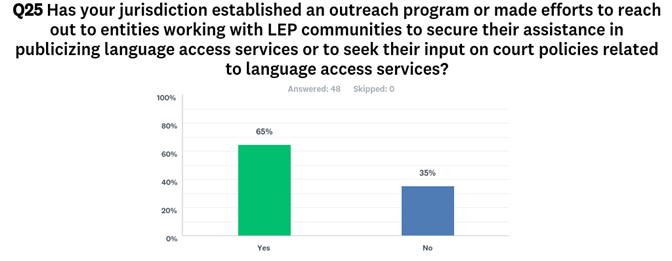Establish procedures to enhance the sharing of information and resources on national and regional levels.
For an effective language access program, it is necessary to collaborate with other partners locally, regionally, and nationally as a means of gathering information, obtaining different expertise, and sharing resources. Action Step 6 recommends establishing procedures to enhance the sharing of information and resources on a national or regional level. To maximize effectiveness, jurisdictions should partner with state justice partners, schools, and community organizations on initiatives such as training or data collection. Also, they should share developed resources such as translated materials or signage for pooling interpreter talent on national, regional, and state networks.
In the survey, a majority of jurisdictions answered that they have now engaged in collaboration and information sharing. Specifically, 65% of jurisdictions have established an outreach program or made efforts to reach out to entities working with LEP communities to secure their assistance in publicizing language access services or to seek their input on court policies related to language access services.
The jurisdictions that do conduct outreach provided information on the successful aspects of their program:
- We are part of an inter-agency working group as well as a language access advocacy organization and these partners provide outreach leads. In addition, we work with court interpreter services coordinators to identify emerging language needs and training issues which become lead-ins for the Commission to work on court policy development and implementation in a timely and constructive manner.
- A Court Interpreter Workgroup was established and charged with recommending standards of operation, best practices, and providing any other general recommendations to improve court interpreting services statewide. To accomplish this task, the Workgroup conducted extensive outreach to several entities to include: state colleges and universities; over 1,000 program participants, entities that work in the court, and other stakeholder groups. As a result, (1) adoption of rule amendments; (2) issuance of administrative orders; (3) establishment of a committee authorized to make recommendations and perform other assignments related to spoken language court interpreting services; (4) creation of a language access coordinator position; and (4) greater uniformity of statewide language access services communications in the trial courts.
- The Alaska Court System collaborates with the Language Interpreter Center to reach out to entities working with LEP communities. The Language Interpreter Center provides information that assists the court system in developing interpreting policies. The court system also reaches out to state court program managers and the NCSC to develop court policies and procedures.
- Radio announcements. Working and meeting with the different Pueblos and Navajo leaders. We held a meeting with various Pueblos and our Supreme Court Justices to present and request input on our new training and certification program for Native Languages. Legal fairs: Legal Aid (event organizer) and the Commission for the Deaf and Hard of Hearing advertise that interpreters will be provided at these events. Members of various community organizations participate in the NM Language Access Advisory Committee's work groups or sub-committees.
- We have reached out to the executive branch Office of Latino Affairs and Office of Asian and Pacific Islander Affairs to help recruit interpreter candidates and provide input on language access policies.
- We do not have a formal outreach program, but we do regularly collaborate with the local Lutheran Family Services office and the local Refugee Resettlement program.
- The Task Force's efforts through Community Outreach meetings (held three: Los Angeles in 10/2016; San Francisco in 3/2016 and San Bernardino - Rancho Cucamonga in 3/2017), inviting community and various stakeholders to discuss language access topics; and efforts by courts and the Court Interpreters Program in reaching out to high school students re: court interpreter profession.
- Entities such as Louisiana Appleseed, Loyola University program for legal and medical interpretation and translation, and other such entities help us spread the word on upcoming training events, programs, etc.
- Our Language Access Committee is in the beginning stages of community outreach and education. We have developed flyers and materials and have identified organizations to conduct outreach with and will begin this effort this summer.
- Regularly established meetings with legal aid offices that represent significant numbers of LEPs have proved beneficial to us and them. In addition, we are starting to increase outreach to local law schools and community organizations.
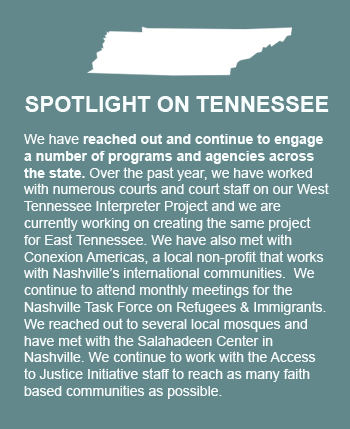 Outreach surveys to community organizations and inviting representatives from Connecticut Legal Aid to attend and participate during the Committee on Limited English Proficiency's meetings
Outreach surveys to community organizations and inviting representatives from Connecticut Legal Aid to attend and participate during the Committee on Limited English Proficiency's meetings - We have reached out to state agencies such as the MS Department of Human Services for their interpreters to attend our training sessions. We also share training and information to the MS
 Department of Health - Health Disparities Division.
Department of Health - Health Disparities Division. - We are updating our state LAP and will send it to CBOs around the state to make them aware of its existence. We usually have 1 individual from a CBO on our advisory committee who can provide insight and input at our meetings; we work with our state Refugee Services Program closely which in turn works with their refugee services providers around the state.
- Workshops; materials for LEP w/ info about availability of services.
- Setting up a table at ethnic community events.
- Board members and stakeholders bilingual judges conduct outreach. Color flyers describing program and trainings.
- Bench cards. Model Administrative Protocol. Presentation to stakeholders, annual "Eliminating Barriers to Justice" CLE.
- Limited outreach with refugee centers.
- Inclusion of LEP advocates on Language Access Committee.
- We reach out to local organizations representing individuals from rare language groups.
- We have spoken to advocates for the MO Coalition Against Sexual and Domestic Violence as well as ESL class participants.
- Information has been disseminated via ethnic media outlets, clergy, public libraries and community groups.
- Surveys of stakeholders agenda items at the Oregon Supreme Court on Inclusion and Fairness Attendance at community conferences (APANO, etc)
- Northern Nevada International Center, University of Nevada, Las Vegas and Truckee Meadows Community College
- There are existing partnerships with local colleges and universities, language agencies, and state agencies.
Established Procedures for Collaboration
Most jurisdictions have established procedures to enhance the sharing of information nationally and regionally. Almost 70% of respondents answered that they have specific procedures set in place designed to exchange information. Forty percent of jurisdictions have set procedures in their LAPs to further the effort. They also have developed training programs and resources designed to effectively exchange information.

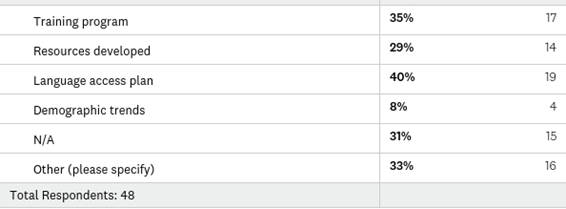
Thirty-three percent of the respondents engage in activities other than those listed above to enhance the sharing of information. Many jurisdictions noted that they actively participate in CLAC and/or NCSC activities. Others have formed regional working groups or regularly exchange information with neighboring states.
- Active participation in NCSC - CLAC activities, related professional groups, and resource to other agencies.
- We share resources regionally and through CLAC.
- NCSC CLAC list-serv.
- Language Services collaboratively works with state court program managers and with the National Center for State Courts.
- Participation in the Council of Language Access Coordinators; collaborative training efforts with surrounding states
- Full participation at the Council of Language Access Coordinators (CLAC) where we give and take ideas not only at conference but via the listserv.
- We are actively in involved with the National Center for State Court’s list-serve. Our interpreter program also manages a webpage and Facebook page. We also speak at judicial conferences, clerks’ conferences, public defender conferences, Tennessee Bar Association CLE programs, and have spoken at the Tennessee Association of Professional Interpreters and Translators conference.
- Translated materials (i.e., how to use a court interpreter, Language ID cards) have been adapted by other jurisdictions and/or state/county agencies for their use.
- Formed regional working group with neighboring state programs
- Presentations at conferences, annual judicial conclave, new judges training, etc.
- We publish and post our annual report on language services; http://mdcourts.gov/accesstojustice/pdfs/languageservicesreportfy16.pdf. We present to justice partners and at national conferences.
- Task Force's presence and participation at various state, regional, and/or national conferences.
- Conversations with neighboring states and sharing of information
- Each judicial district has a local language access coordinator who shares information with the Office of Judicial Administration. Local language access coordinators can access some of this data in an online intranet database.
Successful Community Outreach Initiatives
The survey asked jurisdictions to provide a self-assessment of the most successful initiatives they have conducted for community outreach.
Q26 Please share any “success stories” of community outreach
initiatives you would like to highlight:
- The West Tennessee Interpreter Project was one of the largest outreach events that we have hosted. This project allowed us to reach rural counties in the western part of the state that accounted for approximately 4% of the total claims that our office receives. Since our summit we have can happily report that we have 20+ interpreters in west Tennessee currently
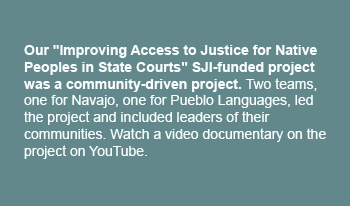 going through the credentialing process and we have rural counties submitting invoices for interpreter services. We have an active Committee for Equality and Justice and local Equal Justice Committees who regularly conduct community dialogues and community listening sessions. The topics of these sessions frequently address issues of our LEP communities.
going through the credentialing process and we have rural counties submitting invoices for interpreter services. We have an active Committee for Equality and Justice and local Equal Justice Committees who regularly conduct community dialogues and community listening sessions. The topics of these sessions frequently address issues of our LEP communities. - Collaboration with refugee resettlement groups in upstate NY has helped to foster relationships with local courts and resulted in more interpreters for those populations.
- Our working relationship with our refugee services program has been successful and continues to be so.
- Radio interviews of Judicial Branch staff on Spanish speaking radio stations covering all aspects of the Branch's functions and role in order to better inform the community
- Since the founding of the Language Interpreter Center in 2007, the court system has regularly been part of the general interpreter training program. This program introduces interpreters to the role of interpreting in the medical, legal, and social service fields. As a result of the court systems involvement, interpreters are more aware of the challenges of legal interpreting, the professional ethics involved, and how difficult courtroom interpreting is.
- CLAS members that incorporate different individuals from different entities from the government and private or non-profit agencies.
- As mentioned under Question 22., the Task Force's Community Outreach meetings (held three: Los Angeles in 10/2016; San Francisco in 3/2016 and San Bernardino - Rancho Cucamonga in 3/2017), inviting stakeholders including: court leadership, judicial officers, legal aid organizations, community leaders, court interpreters and Language Access Representatives (and other court staff), to come together to discuss various topics regarding language access.
- Increase in participants following the press releases.
- Very positive feedback from colleges and universities. A new college youth program has assisted a bilingual participant pursue certification. Candidate is planning to take court interpreter oral exam this fall.
- We have successfully partnered with the local ATA chapter (DVTA) to promote certification. The coordinator for our Interpreter Certification Program spoke about working with interpreters as part of a panel at one of our local law schools. This was an opportunity for us to increase awareness of our language access program.
- Video recording cultural/language community members about perceptions and experiences interacting with "the court" which have been embedded in online judicial personnel training modules.
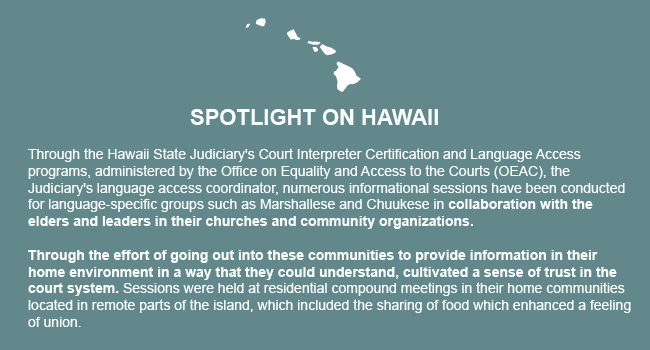
Successful Collaboration Initiatives
Q27 Please share any successful collaboration initiatives
you have employed that you would like to highlight:
- Inviting representatives from Connecticut Legal Aid to the Committee on Limited English Proficiency's meetings has provided the committee members and the Branch with accurate feedback and input towards the improvement of services and the revision of the LAP
- Mississippi's Administrative Office of Courts has partnered with Arkansas, Louisiana and Tennessee's
 court interpreter programs to provide regional training events and conferences for interpreters.
court interpreter programs to provide regional training events and conferences for interpreters. - We recently expanded membership on our Language Access Committee to include community partners representing major language groups in Illinois: Spanish, Polish, Korean and Mandarin Chinese, and also South Asian languages like Hindi, Urdu and Gujrati.
- We collaborated in a 2 year partnership on domestic violence and vicarious trauma with a county of diverse population. A federal grant supported county and interpreter training.
- Regional working group with neighboring state program directors - excellent collaboration on rules, resources, fees, training and reciprocity process.
- OEAC also works with other State departments and agencies to identify areas where coordination or collaboration would improve the efficiency with which language access services can be provided. In addition to participating in the State Language Access Coordinators meetings convened by the Hawai‘i Office of Language Access, the Judiciary also participates in the Roundtable meetings convened by the Overcoming Barriers to Access to Justice Committee of the Access to Justice Commission (OBAJ Roundtable). The OBAJ Roundtable is comprised of invited entities working to reduce language and other barriers to access to justice and aims to facilitate collaboration and cooperation among its participants and members. The Judiciary also participates in the Hawai‘i Language Roadmap Initiative Project which acknowledges the realization that to compete in a global economy and to respond to the demands of its increasingly diverse population, Hawai‘i must promote and support the study of foreign languages and culture.
- We have collaborated with the Tennessee Supreme Court‘s Access to Justice Commission working with their faith-based initiatives. We continue to work with the Tennessee Foreign Language Institute in Nashville. We have also met with staff of Conexion Americas and the Tennessee Department of Workforce and Development about the possibility of collaboration.
- Loyola University program for interpreting and translating has partnered with Orleans Criminal District Court for interpreter courtroom practice and forms translation.
- Truckee Meadows Community College and the University of Nevada Las Vegas have both offered courses to certified court interpreters with AOC approved CEUs and both have offered simultaneous and consecutive modes of interpreting training to prospective court interpreters in preparation for the oral exams.








